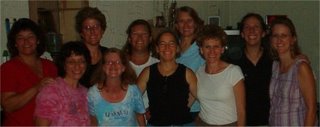I grew up in a family with five generations of hearing loss. My Great-Grandmother, Grandmother, my mom and all of her siblings were deaf or hard of hearing and none of them knew sign language. All of my siblings have hearing loss as well as my children and one niece.
My mother’s hearing began to decline in her twenties. All of my brothers and sisters were born hearing and one by one, we each lost our hearing. My oldest sister was three years old when she fell, hit her head and instantly became profoundly deaf. My parents sent her off to live with my aunt and she attended Central Institute for the Deaf, an oral school. My brother Dennis was 36 years old when a wooden beam fell on him at work and he woke up in the hospital two days later with a severe hearing loss. My sister Jeanie began to lose hearing in her 20’s and just last summer, she slipped on a rug and became profoundly deaf. My brother Kenny has just recently began to wear hearing aids for a mild loss that was caused from a fall while barefooting.
I came along 10 years after the last sibling was born. When I was five, I was diagnosed with a moderate to severe hearing loss. I muddled along in school, receiving a hearing aid in 4th grade and speech therapy. Because I “functioned” so well and was able to keep up my grades, I was pretty much lost in the system. Teachers lavished praise on the “girl with the hearing loss.” My loneliness was often overlooked.
My life stayed this way all through my school years. I made friends with a select few who could look beyond my hearing loss. In high school, I met another girl, Shawn, who also wore hearing aids and we became fast friends. We each shared the horror of dealing with group situations and the anxiety that came with it. We learned to adapt so well that some of our friends had no clue that we wore hearing aids. (I never wore my hearing outside of school or during the summer.) Of course, we missed out on the punch lines of many jokes while laughing along with the others.
When I began attending classes at the local community college, I started to fear that I had no future ahead of me. I had interviewed for several jobs, but no one had the courage to hire me or deal with my inability to use the phone. I took one job as a dishwasher at a local restaurant and earned money mostly by babysitting. The future began to look pretty bleak. The few guys that I dated weren’t good marriage prospects. I began to wonder just where I was headed.
On a whim, I decided to transfer to a college that had a program for deaf and hard of hearing persons. My mother reluctantly supported my decision. She was afraid to see her last baby go off to the great unknown. How in the world would I cope at a university when I could barely get by at the community college?
Just before going off to college, I was water skiing on my bare feet and I turned to cross the wake. I fell hard, and for the next few days, I kept feeling like I had water in my ear. I had become profoundly deaf.
Going off to college turned out to be a blessing. At first, it was quite a culture shock. I was living on a co-ed floor with people who signed so fast that it was intimidating. Little by little, I was transformed. Slowly, I was introduced to a Deaf life to the point it felt like “coming home.” I was in a world where hearing didn’t matter. It was a world where, if I missed the punch line of a joke, someone would kindly sign it over again until I could join in the laughter. Of course, occasionally I encountered: “Sorry, train gone!”
My mother and siblings began to see a new person blossom in front of them. I introduced them to a TTY, and a new, accessible world began to open for them. My mom admitted that she wished she had known more about sign language while we were growing up so that we could have had access to interpreters.
When my oldest son became deaf, my mom began to ask how to sign certain things. It made me smile to see my 70-year old mom signing to my kids. One of her favorite signs was the sign for “I love you,” which is made with the thumb, forefinger and pinky finger extended and the two middle fingers bent downward.
Every time we got into the van to leave to go home, Mom would flash her “I love you” sign. There was only one problem though…
Mom would occasionally forget and leave the thumb bent inward, which turned the sign into “B.S.”
It is quite a picture to see Mom flashing her “B.S.” sign when we are pulling out of the driveway. It always puts a smile on my face.
It’s no B.S., Mom. I love you too!
